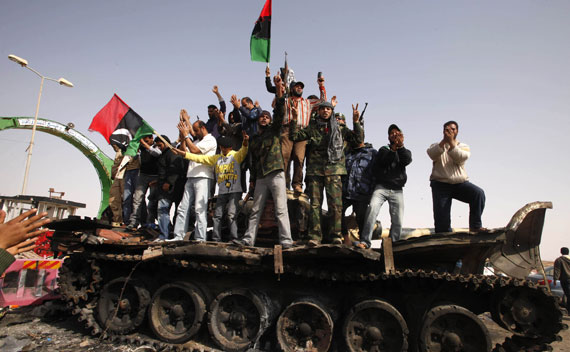Did Operation Odyssey Dawn Prevent a Libyan Genocide?
More on:

The Senate Foreign Relations Committee held a hearing this week on "Perspectives on the Crisis in Libya." Committee Chairman John Kerry (D-Mass.) assembled a great lineup: Richard Haass of the Council on Foreign Relations, Tom Malinowski of Human Rights Watch, and Dirk J. Vandewalle of Dartmouth College. The hearing covered a lot of ground, but two questions stood out: were Qaddafi forces on the verge of turning Benghazi into a killing field, and if so, how do we know it?
These are tough questions both to ask and answer. We naturally want to save every innocent life. But no policymaker can meet that standard. President Obama ordered U.S. forces into action against Libya but stood pat as hundreds of civilians died in political violence in the Ivory Coast. He made a choice that Libya crossed a line and Ivory Coast didn’t.
Knowing when the line has been crossed goes to the heart of the concept of a responsibility to protect that the Obama administration is championing in Libya. It’s a tough call. Policymakers need to determine both what harm they might be preventing and what harm they might be creating.
The latter issue often gets overlooked. Military strikes like we have seen in Operation Odyssey Dawn inevitably (and regrettably) produce "collateral damage.” Outside interventions can also prolong fighting, prompt people who would otherwise have remained civilians to take up arms, and raise the death toll.
Critics of Operation Odyssey Dawn such as Richard Haass, Alan Kuperman, Steve Chapman, Paul Miller, and Stephen Walt raise fair questions about whether Libya crossed the line that called for action. They note that pro-Qaddafi forces had not committed any large-scale massacres in any of the towns or cities they had previously taken. Yes, Qaddafi had denounced the rebels as “rats,” and he pledged to exact revenge. But hot rhetoric is not unusual in insurgencies and civil wars.
The critics can never prove they are right. They acknowledge that the fight for Benghazi would have been bloody in any event. A failure to find orders for pro-Qaddafi forces to carry out ethnic cleansing doesn’t mean it would not have happened. Neither does the fact that logic suggests that Qaddafi had good reasons to avoid repeating Rwanda.
What is troubling, though, is that it’s not obvious that the White House scrutinized the claim that Qaddafi was bent on mass murder. If it commissioned intelligence assessments of what Qaddafi was likely to do in Benghazi and what the casualty rates were likely to be, they haven’t leaked. Again, without knowing the harm you are likely to witness you cannot assess the acceptability of the harm you are about to impose.
This is a big failing. As David Bosco notes even as he criticizes Walt for dismissing the likelihood of a Rwanda-style genocide in Libya:
If humanitarian intervention is to remain a live possibility, there must be much more public scrutiny, debate and discussion of what triggers that intervention and what level of evidence we can reasonably require. Did administration officials have communications intercepts suggesting plans for large-scale killings of civilians? How exactly did they reach their conclusion that these reprisals were likely? It should be no more acceptable to simply accept government claims on this score than it was for previous administrations.
This debate is not going to go away. What advice would you give a president about how to decide whether a potential humanitarian catastrophe merits a U.S. response?
More on:
 Online Store
Online Store